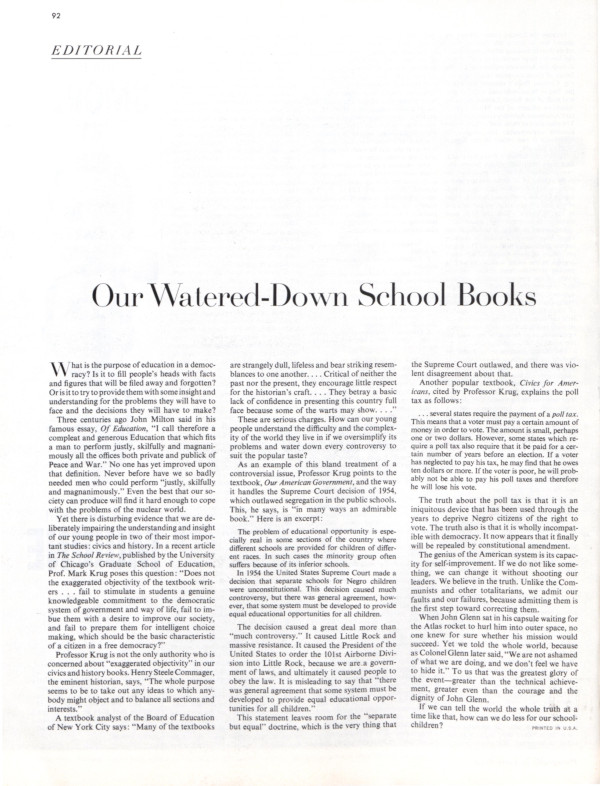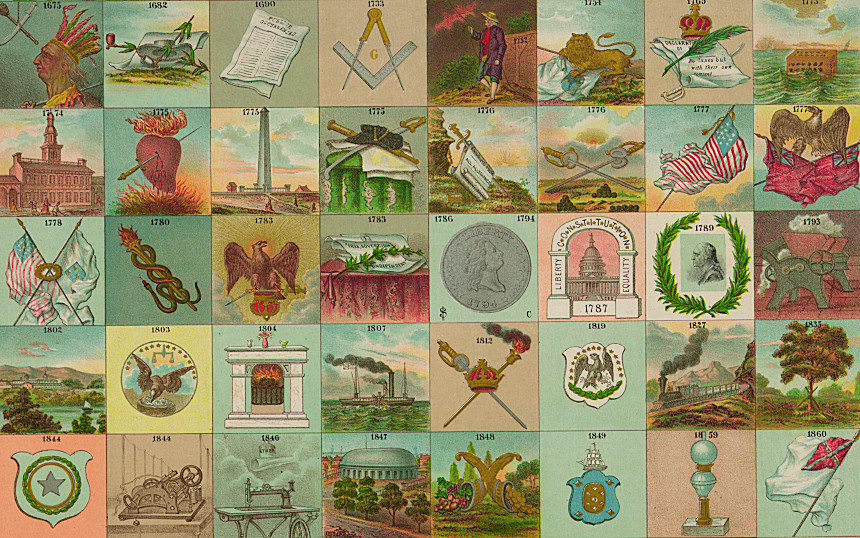Disagreements about school books are once again in the news, as political activism is heating up the process of deciding what will be taught. History books have probably come under the greatest scrutiny. On one side, activists want textbooks that address minority histories and racism in America. Others want history books that emphasize traditional values and make students proud to be American.
Possibly the most contentious topic in American history education is slavery; how it is taught is a fraught topic in the U.S.; reasons vary from state and school board politics to a reluctance to navigate an uncomfortable topic in the classroom.
Some school systems will be using The 1619 Project, a collection of writings that reframes the Black experience in America. The book says its aim is to place “the consequences of slavery and the contribution of black Americans at the very center of our national narrative.”
Other school districts have banned the initiative, deeming it divisive, revisionist, and dismissive of the principles on which the nation was founded.
The teaching of history has always been a source of debate, which has at times resulted in violence. In 1974, West Virginia schools introduced new textbooks that included minority opinions and challenging modern writings. Parents protested and made threats and demands. One elementary school was dynamited, another firebombed. School buses were shot at. Twenty percent of students stayed home, and the houses of some students who continued to attend were stoned.
In the 1960s, people were beginning to question how certain topics like slavery were taught. Textbook authors typically misrepresented or dismissed issues that had divided America in the past. In History in the Making, Kyle Ward shows how some textbooks distorted the indignity and cruelty of slavery:
“Slaves worked only because they were made to do so; they worked slowly, carelessly, and stupidly, and were fit for nothing better than to hoe cotton.”
~1889, A History of the United States for Schools, Alexander Johnson
“Although he was in a state of slavery, the negro of plantation days was usually happy. He was fond of the company of others and liked to sing, dance, crack jokes, and laugh… He wanted to be praised, and he was loyal to a kind master or overseer.”
~1933, American History, Thomas M. Marshall
“Life in the slave quarters on many a plantation was not too unhappy. During the day the small children played merrily, often with the younger white children from the ‘great house.’ In the twilight young and old gathered to sing and dance… On special occasions the slaves were allowed to attend picnics or to hunt… In general, slaves were too valuable to be mistreated.”
~1950, This is America’s Story, Howard B. Wilder
“On the larger plantations, the slaves were usually well treated. After all, they were valuable property and it was foolish to overwork or injure them.”
~1961, This Is Our Nation, Paul F. Boller and E. Jean Tilford
The Saturday Evening Post editors observed this trend in 1962, and responded with an editorial in the April 29 issue titled “Our Watered-Down School Books.” Modern history books, they said, tried to balance all interests and remove anything that anyone might object to. They took issue with a contemporary textbook, Our American Government, which summarized the tumult that followed landmark 1954 Supreme Court decision in Brown v. The Board of Education as follows: “This decision caused much controversy, but there was general agreement, however, that some system must be developed to provide equal educational opportunities for all children.” The Post editors countered:
The decision caused a great deal more than “much controversy.” It caused Little Rock and massive resistance. It caused the President of the United States to order the 101st Airborne Division into Little Rock….It is misleading to say that “there was general agreement that some system must be developed to provide equal educational opportunities for all children.” This statement leaves room for the “separate but equal” doctrine, which is the very thing that the Supreme Court outlawed, and there was violent disagreement about that.
These watered-down books did not reflect the American ethic of telling the unvarnished truth. The editors noted that America’s strength is that “we admit our faults and our failures, because admitting them is the first step toward correcting them.”
Rather than debate what history textbooks should or shouldn’t include, we might ask a more basic question: what is the purpose of textbooks? If it’s to educate children, the next question is: what is the purpose of public education?
The National Education Association asked parents that question in 2016. One quarter of the parents said education was intended to prepare students for work, while 26 percent believed it was to produce good citizens. The largest portion (45 percent) said the goal was academic achievement — essentially to prepare students for more school.
The Post’s editors in 1962 believed the purpose of education was to prepare children to become adults. History, especially, should help them confront the sorts of problems they’d face as grown-ups.
It shouldn’t try to hide the dark places of our past. To do so would prevent students from learning that “the genius of the American system is its capacity for self-improvement.”

Featured image: Detail, symbolic centenary chart of American history comprised of symbols representing events in American history, presented chronologically (Brett Lithographing Co. 116 Fulton St. N.Y., Library of Congress)
Become a Saturday Evening Post member and enjoy unlimited access. Subscribe now




Comments
What would you have America and other democratic Freedom Loving nations do? . . . surrender to Pootin? He is a brutal dicktator who hates us and every other democratic Nation. Russia has a Long history of TYRANTS Expanding their Borders and sooner or later the Bully must be confronted and stopped and doing it with allies is a lot smarter than an Isolationist policy and acting alone. Trembling and cowering in fear and Appeasement only encourages more Aggression and war.
Standing Tightly with our NATO and other Like Minded Allies is the best and cheapest way to prevent World War III.
I have little to add except that America was founded on a contradictory premise: “We hold these truths to be self-evident, that all men are created equal.” Obviously they did not mean all people of color, only white, male landowners over 21. That has changed. It did not change painlessly. There is more that has to change, but that won’t change painlessly either. I firmly believe that there will be less pain when more people read and study the way the past has brought us to the point where we find ourselves now.
At this point in time, I don’t really think American history can or even should be attempted to be taught in the current climate of this nation being at war with itself, controversy over the least little thing, no allowances for differences in opinion, people physically attacking/shooting each other. A President whose only commitment is to the American Military Industrial Complex,Wall Street, Boeing, Northrop Grumman, Lockheed Martin etc. and all of the share and stockholders.
Keeping America in endless, undeclared wars it has NO business being in, with the American worker’s tax money. Killing and bombing people, but never to take care of our own here, even in the 3rd year of a pandemic, and all the businesses lost, income lost, homelessness, unrelenting inflation? But whatever Zelensky wants, he gets; untold billions at the snap of his fingers—or before!
The list goes on and on. At this point, possibly sticking to dates certain inventions came about, like Eli Whitney inventing the cotton gin in 1793. Of course, I suppose even THAT would lead to controversy. Yeah. American history probably should be put on ice, take a curriculum hiatus, given a ‘time out’ or whatever, until further notice in the no-win, mixed-up, messed-up, volatile 21st century.